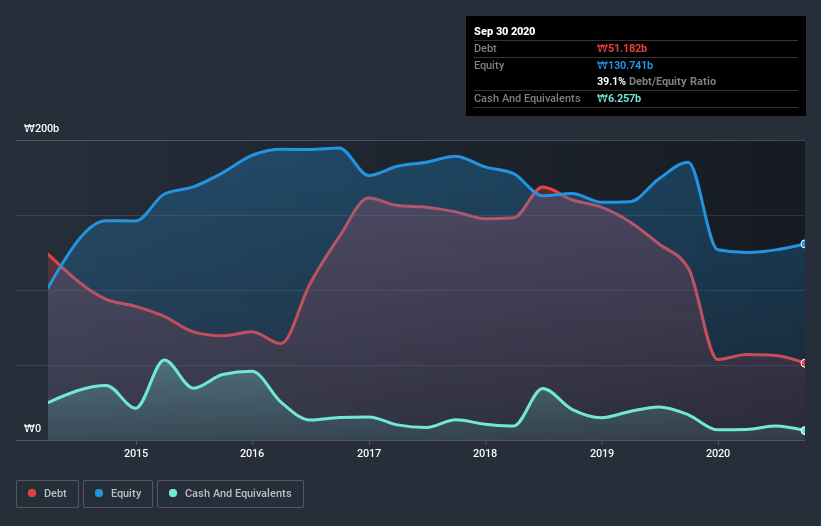- South Korea
- /
- Chemicals
- /
- KOSDAQ:A004650
These 4 Measures Indicate That Changhae Ethanol (KOSDAQ:004650) Is Using Debt Extensively
Warren Buffett famously said, 'Volatility is far from synonymous with risk.' So it seems the smart money knows that debt - which is usually involved in bankruptcies - is a very important factor, when you assess how risky a company is. Importantly, Changhae Ethanol Co., Ltd. (KOSDAQ:004650) does carry debt. But the real question is whether this debt is making the company risky.
When Is Debt A Problem?
Debt assists a business until the business has trouble paying it off, either with new capital or with free cash flow. If things get really bad, the lenders can take control of the business. However, a more frequent (but still costly) occurrence is where a company must issue shares at bargain-basement prices, permanently diluting shareholders, just to shore up its balance sheet. Of course, debt can be an important tool in businesses, particularly capital heavy businesses. The first step when considering a company's debt levels is to consider its cash and debt together.
See our latest analysis for Changhae Ethanol
What Is Changhae Ethanol's Debt?
The image below, which you can click on for greater detail, shows that Changhae Ethanol had debt of ₩51.2b at the end of September 2020, a reduction from ₩114.6b over a year. However, because it has a cash reserve of ₩6.26b, its net debt is less, at about ₩44.9b.

How Strong Is Changhae Ethanol's Balance Sheet?
We can see from the most recent balance sheet that Changhae Ethanol had liabilities of ₩57.3b falling due within a year, and liabilities of ₩5.88b due beyond that. Offsetting these obligations, it had cash of ₩6.26b as well as receivables valued at ₩25.9b due within 12 months. So its liabilities total ₩31.0b more than the combination of its cash and short-term receivables.
This deficit isn't so bad because Changhae Ethanol is worth ₩97.5b, and thus could probably raise enough capital to shore up its balance sheet, if the need arose. But we definitely want to keep our eyes open to indications that its debt is bringing too much risk.
We measure a company's debt load relative to its earnings power by looking at its net debt divided by its earnings before interest, tax, depreciation, and amortization (EBITDA) and by calculating how easily its earnings before interest and tax (EBIT) cover its interest expense (interest cover). Thus we consider debt relative to earnings both with and without depreciation and amortization expenses.
Changhae Ethanol has a debt to EBITDA ratio of 3.9 and its EBIT covered its interest expense 2.8 times. Taken together this implies that, while we wouldn't want to see debt levels rise, we think it can handle its current leverage. Even worse, Changhae Ethanol saw its EBIT tank 75% over the last 12 months. If earnings keep going like that over the long term, it has a snowball's chance in hell of paying off that debt. When analysing debt levels, the balance sheet is the obvious place to start. But it is Changhae Ethanol's earnings that will influence how the balance sheet holds up in the future. So if you're keen to discover more about its earnings, it might be worth checking out this graph of its long term earnings trend.
But our final consideration is also important, because a company cannot pay debt with paper profits; it needs cold hard cash. So we always check how much of that EBIT is translated into free cash flow. During the last three years, Changhae Ethanol generated free cash flow amounting to a very robust 83% of its EBIT, more than we'd expect. That positions it well to pay down debt if desirable to do so.
Our View
Changhae Ethanol's EBIT growth rate and interest cover definitely weigh on it, in our esteem. But the good news is it seems to be able to convert EBIT to free cash flow with ease. Taking the abovementioned factors together we do think Changhae Ethanol's debt poses some risks to the business. While that debt can boost returns, we think the company has enough leverage now. When analysing debt levels, the balance sheet is the obvious place to start. However, not all investment risk resides within the balance sheet - far from it. To that end, you should be aware of the 3 warning signs we've spotted with Changhae Ethanol .
If, after all that, you're more interested in a fast growing company with a rock-solid balance sheet, then check out our list of net cash growth stocks without delay.
If you decide to trade Changhae Ethanol, use the lowest-cost* platform that is rated #1 Overall by Barron’s, Interactive Brokers. Trade stocks, options, futures, forex, bonds and funds on 135 markets, all from a single integrated account. Promoted
New: AI Stock Screener & Alerts
Our new AI Stock Screener scans the market every day to uncover opportunities.
• Dividend Powerhouses (3%+ Yield)
• Undervalued Small Caps with Insider Buying
• High growth Tech and AI Companies
Or build your own from over 50 metrics.
This article by Simply Wall St is general in nature. It does not constitute a recommendation to buy or sell any stock, and does not take account of your objectives, or your financial situation. We aim to bring you long-term focused analysis driven by fundamental data. Note that our analysis may not factor in the latest price-sensitive company announcements or qualitative material. Simply Wall St has no position in any stocks mentioned.
*Interactive Brokers Rated Lowest Cost Broker by StockBrokers.com Annual Online Review 2020
Have feedback on this article? Concerned about the content? Get in touch with us directly. Alternatively, email editorial-team (at) simplywallst.com.
About KOSDAQ:A004650
Changhae Ethanol
Produces and sells spirits from sugar cane, tapioca, rice, and barley crops in South Korea.
Flawless balance sheet 6 star dividend payer.
Market Insights
Community Narratives



